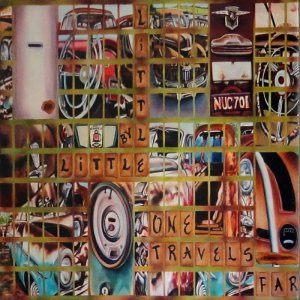
“Nostalgia” by South African artist Eljana van der Merwe
Last week, The New York Times ran an article on nostalgia that I found both irritating and refreshing. Luckily, its mix of good and bad says a lot about problems in communicating science. It also hints at ways fiction can fill in gaps when science takes on subjective experiences, like memory.
Drawing from social psychology studies, the article presents nostalgia as a misunderstood experience. Although nostalgia is often bittersweet, research suggests that it makes people feel more secure in their social connections and view their lives as more meaningful. That’s a compelling topic: a set of emotions that tinge memories with a sense of longing but in the long run are fulfilling. And it’s intriguing how participants in these studies have capitalized on nostalgia to counteract negative feelings, including loneliness and even physical cold.
That said, “What Is Nostalgia Good For?” demonstrates hallmarks of popular neuroscience and psychology writing that I think do harm to readers. The first is the need for a self-help takeaway that generates superficial advice. Many popular science pieces offer vague directives: “How to strengthen your brain,” “Make your brain smarter,” “What happy people do differently,” and so forth (Google any of those titles and legions will appear). I suspect that kind of angle is sometimes meant to convert dry-seeming knowledge into a more marketable product. While not all the resulting advice is bad, it can misrepresent the way research works. Pretty much no single finding, or even collection of preliminary studies, will translate into simple advice anyone can follow to change their life or brain.
So it sounded a small alarm when this article quoted nostalgia researcher Constantine Sedikides as recommending that people “nostalgize” two or three times a week. That’s a well-meaning tip, but I’m not sure either the researcher or the writer considered what it might entail. Nostalgia is an emotional experience, and you can’t schedule repeat occurrences of emotions the way you would, say, a yoga class. I don’t box in my experience of contentment for 2:30 p.m. on Tuesdays and Thursdays. I doubt I could do that for nostalgia without compromising its sincerity. Though this point is a small part of the article, it still gives a whiff of the self-help rhetoric that can cheapen psychology/neuroscience reporting.
My second issue applies across science writing: not commenting on limitations in the discussed studies. I find this habit especially puzzling since most scientific papers list their meaningful limitations, making it easy for journalists to identify them and maybe add some of their own. The research on nostalgia’s benefits has a classic one: its subjects are largely college students. Sure, that point may not damn the research. But it’s worth acknowledging when studies on social behavior generalize about people based on groups with a unique socializing trait, like their education level.
That covers my irritation with “What Is Nostalgia Good For?” But to be fair, I picked on this article in part because I enjoyed it. And one of the aspects I most enjoyed was its nods at the value of art and literature in understanding something like nostalgia. Stories like the Odyssey and films like Casablanca — both of which the article referenced — say plenty about nostalgia’s triggers and textures. Thousands of years before researchers showed that nostalgia can counteract loneliness, Homer’s Odysseus was putting that fact to use. And the doomed romance of Casablanca highlights the melancholy that clings to even some of the most precious memories. More broadly, fiction offers something experiments can’t: snapshots that evoke first-person thoughts and feelings, those messy aspects of experience that science has to translate into technical terms.
I also liked the article’s doses of history — who knew that clinicians have viewed nostalgia as a disorder? It’s a useful reminder that definitions of mental “disorders” aren’t set in stone, and that our understanding of nostalgia is still likely to change. And given Homer’s ancient insights, maybe future studies should look to books, films and art for inspiration.